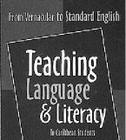
Title: From Vernacular to Standard English
Author: Dennis R. Craig
Publisher: Ian Randle Publishers
Reviewer: Paul H. Williams
Dennis R. Craig might be dead, but his book, From Vernacular to Standard English, has brought the issue of language teaching and learning alive, and no teacher of language and literacy should be without a copy. As the subtitle says, it is about teaching language and literacy to Caribbean students. And with the present challenges in the teaching and learning of English language that many local educational institutions are facing, its publication is quite timely.
All eight chapters could have been separate books, but they adequately address the different aspects of language teaching to students in this linguistic melting pot, which is the Caribbean. Chapters one and two address the co-existence of vernacular and official languages, and the language and literacy education of vernacular (Creole) speakers. They succinctly put the linguistic situation in the Caribbean in perspective.
In order for the teaching of English to be effective, Craig said the needs of students "should be carefully reviewed and redefined. Thereafter, consideration should be focused upon the broad types of learning experiences, or educational procedures or programme components that become necessary, if the mentioned redefined needs are to be satisfied".
Prerequisites
Thus, before programmes for language and literacy are put in place certain prere-quisites must be met and these are: Continuity in cognitive growth; the development and use of language awareness; the orientation of teaching and learning; classroom procedures that implement the orientation; the component of school programmes, and evaluation as a programme component.
The other major topics are: The background of language - Teaching perspectives; literacy in TESORV (Teaching English to Speakers of a Related Vernacular); procedures for the primary level; procedures for post-primary situations characterised by inadequate primary-level achievement; and procedures for the secondary level.
At the end of each chapter there are questions and activities which help the reader to put in practice some of the issues discussed. Also, there are useful notes, and other references that can be used to reinforce the content.
Teachers will also find the 'Syllabus Resources' section helpful. It looks at basic morphological and syntactic contrasts between internationally accepted English and English-based, Creole-influenced vernaculars; and some forms of English words and sentences that can be selected for direct teaching to Creole-influenced vernacular speakers.
Programme
There is also an outline of a programme for maintaining the home language and culture, and strengthening the language awareness of pupils.
Syllabus Resource - 4 explores some activities in the direct teaching and learning of language structure. These include perception/reception which may or may not become confirmed by overt imitation or repetition; internalisation through mental noting, repetition, rote learning, inference, deliberate study, etc; controlled practices, and the comprehension of meanings.
List of purposes
In some purposes for the creative utilisation of language structures, readers are given a list of purposes and how these might be carried out. They are: the satisfaction of felt needs, desires or wishes in making requests and giving instructions; the communication of real or imaginary experience, the communication of thinking and opinion; the communication of sensitivity, emotion and feeling, and the giving of pleasures to oneself and/or to others.
The short biography on the back cover says, "Dennis Craig was a former vice-chancellor of the University of Guyana who researched and published extensively in the fields of Creole linguistics and education. He held a PhD from the University of London and a personal professorship in language education from the University of the West Indies."
Previously published in 1999, as Teaching Language and Literacy Policies and Procedures for Vernacular Situations, this book 'was published with amendments by Zellynne Jennings-Craig'. It is not only for teachers of language, but the serious student of language should get one.

